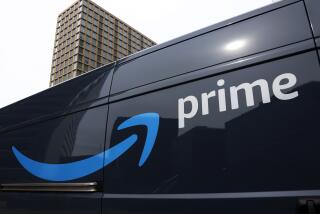Software Giant Hears Footsteps on Internet
- Share via
SEATTLE — Being called a monopoly by a federal judge may be the least of Microsoft’s worries as it enters the new century.
The much bigger threat for the software giant is keeping pace with the next evolutionary advance of the Internet.
Even Microsoft’s 90% control of personal desktop computers and its 60% share of the Web browser market provide no guarantees that it will remain dominant in the Internet Age. This speedy and rule-changing world already has forced the planet’s largest software company to reinvent itself twice in five years.
The company hopes a two-pronged strategy will enable it to maintain a formidable grip on the leadership of technology, but so many natural forces are aligned against it.
No longer is shrink-wrapped software, Microsoft’s forte, the center of gravity in the Internet Age. All of those billions of lines of code that constitute computer software sold on retail shelves is becoming a more ephemeral product. Increasingly, this product is delivered online, either as a subscription or as a service.
The Internet also has diminished the importance of the PC, pushing it from its perch on top of the hill to just one of a growing constellation of digital devices: mainframe servers, game machines, hand-held personal organizers, smart cell phones and interactive pagers, among much else.
This has opened the market for new competitors as well as reinvigorated some of Microsoft’s archrivals. America Online, Sun Microsystems, Yahoo, Oracle, RealNetworks, Novell, Corel and IBM’s Lotus all aim to wrest significant business away from Microsoft.
From deep inside its Redmond, Wash., bunkers, Microsoft sees nothing but armies of competitors massing at the borders of all segments of its business. These competitors are a point and click away from neutering the entire empire.
Or, at least, that’s the mantra emanating from the thousands of tiny Microsoft offices that helped make Chairman Bill Gates the wealthiest man on the planet.
Forgive Gates if he appears more paranoid and testy than usual on the eve of the new millennium. The commercial and legal pressures bearing down on him is enough to turn anyone into a grinch this holiday season.
But don’t feel sorry for him.
He and President Steve Ballmer already have devised a new strategy that includes nothing less than reinventing the company, crumpling up the 20-year-old vision statement, and preparing the 30,000 troops for the mother of all battles.
No longer is the war cry a PC on every desk and in every home. Now, the company mantra is all about empowering people any time, anyplace and on any device.
“The personal computer and the Internet are the fundamental technologies which all of us has to harness to fulfill that vision,” Ballmer recently told software developers in San Francisco. “We really are talking about a world in which all software is a service, all Web sites are services.”
For the last two years, the company has been on a buying binge aimed at two strategic goals: expanding the markets for Microsoft software beyond the personal computer and beefing up its Web business through Microsoft Network.
Microsoft also is aided by thousands of loyal foot soldiers who play to win. They are part of a culture that no rival has ever quite replicated: a steely pragmatism and willingness to change. Such culture is embedded in the company’s fiber.
“We compete and we play hard,” said Stephen Schiro, a Microsoft vice president for retail sales. “But I think that’s the game. I think that’s part of it.”
Gates’ and Ballmer’s two-pronged gambit resembles a chess move known as a pincer movement: a tactic that could checkmate its opponents in two sweeping moves.
The first move is already in place: a renewed and refocused effort on its lackluster MSN.com. Here, Microsoft will wage battle against AOL and Yahoo for the hearts and minds of Main Street, America.
With more than half of America not plugged in to the Internet, MSN aims to make the “everyday Web” a reality for people in Peoria. Brad Chase, one of MSN’s key field generals, vows to sign up more new users than AOL next year.
AOL, the dominant Internet access provider, recently announced that it had signed up 20 million subscribers. MSN, by contrast, has about 2.5 million subscribers. But MSN is really only beginning to compete.
Microsoft will partner with computer makers to put its simplified operating system--Windows CE--into easier-to-use Web computers, such as the Web Companion, and other mobile and hand-held devices.
It has forged partnerships and alliances with giant retailers such as Radio Shack.
The other half of Microsoft’s gambit involves Windows 2000, the new high-powered operating system that aims to be the backbone, or “platform,” for the Internet Age. Microsoft designed Windows 2000--which will reach retail shelves Feb. 17--for corporations running large-scale servers and for Web companies renting software applications to subscribers.
Gates and Ballmer already know that the Net has shifted the real action from the desktop to the server--the cherished turf of rival Sun Microsystems. But Windows 2000 is aimed squarely at controlling the server market, which drives all Web-based businesses.
“This shift in the industry has been underway for more than a year and is picking up steam,” said Dwight Davis, industry analyst for Summit Strategies. “It is the real fundamental challenge Microsoft faces going forward.”
Experts say fewer people or businesses will buy packaged software and install it on their hard drive, which has been Microsoft’s forte. In the future, they will rent the application from a Web company for as long as they need the service.
Application hosting is part of the Web services trend that Microsoft fears the most. But at the same time, it is reinventing the company around this next-generation Web platform.
Vows Ballmer: “We will really push to be a leader in this environment.”






